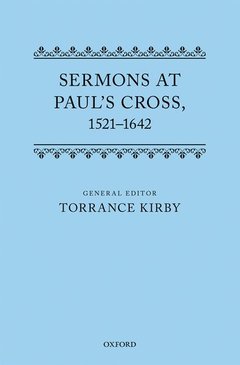Description
Sermons at Paul's Cross, 1521-1642
Coordinators: Kirby Torrance, Stanwood P. G., Morrissey Mary, King John N.
Language: English
Publication date: 09-2017
580 p. · 17x23.4 cm · Hardback
580 p. · 17x23.4 cm · Hardback
Description
/li>Biography
/li>
The open-air pulpit in Paul's Churchyard in the City of London, known as Paul's Cross, is one of the most important vehicles of popular public persuasion employed by government from the outset of the Henrician Reformation in the early 1530s until the opening salvos of the Civil War when the pulpit was demolished. Paul's Cross became especially prominent as the public face of government when Thomas Cromwell orchestrated propaganda for the Henrician reformation in the early 1530s. Here too, after the accession of Edward VI, Hugh Latimer preached his 'Sermon on the Ploughers', one of the most celebrated sermons of the English Reformation. While Edmund Bonner, Bishop of London sat here listening to a sermon in 1553, a riot broke out. In November 1559, John Jewel preached his celebrated 'Challenge Sermon' here, arguably the most influential of all sermons delivered at Paul's Cross throughout the Tudor era. Near the end of Elizabeth's reign William Barlow mounted the pulpit to pronounce the government's response to the abortive rebellion of the Earl of Essex. Barlow preached another sermon at Paul's Cross in the wake of the Gunpowder Plot in 1605. Throughout the early modern period, Paul's Cross remained continuously at the epicentre of events which radically transformed England's religious and political identities. And throughout this transformation, animated as it was by a popular 'culture of persuasion' which Paul's Cross itself came to exemplify, the pulpit contributed enormously to the emergence of a new public arena of discourse. Many of these sermons preached at Paul's Cross have been lost; yet a considerable number have survived both in manuscript and in early printed editions. This edition makes available a selection of Paul's Cross sermons representative of this rich period in the maturation of England's popular culture of persuasion.
Torrance Kirby is Professor of Ecclesiastical History at McGill University. He is the author of Richard Hooker Reformer and Platonist (Ashgate, 2005) and co-editor with P. G. Stanwood of Paul's Cross and the Culture of Persuasion in England, 1520-1640 (Brill, 2013). Professor Kirby is editor of A Companion to Richard Hooker (with Rowan Williams; Brill, 2008). P.G. Stanwood is Professor of English Emeritus at the University of British Columbia. Professor Stanwood is a specialist in the Renaissance and in seventeenth-century English literature; he has edited nine books, including the final three books of Richard Hooker's Of the Lawes of Ecclesiastical Polity (Harvard University Press, 1981) and John Cosin: A Collection of Private Devotions (Oxford University Press, 1967). Mary Morrissey is Associate Professor of English at the University of Reading. Her primary research subject is Reformation literature, particularly from London. She is particularly interested in Paul's Cross, the most important public pulpit in sixteenth- and seventeenth-century England. Her publications include Politics and the Paul's Cross Sermons, 1558-1642 (OUP, 2011). John N. King is Distinguished University Professor Emeritus, Ohio State University. He is the author of English Reformation Literature: The Tudor Origins of the Protestant Tradition (Princeton University Press, 1982); Tudor Royal Iconography: Literature and Art in an Age of Religious Crisis (Princeton University Press, 1989), and Tudor Books and Readers: Materiality and the Construction of Meaning (Cambridge University Press, 2009).
© 2024 LAVOISIER S.A.S.




